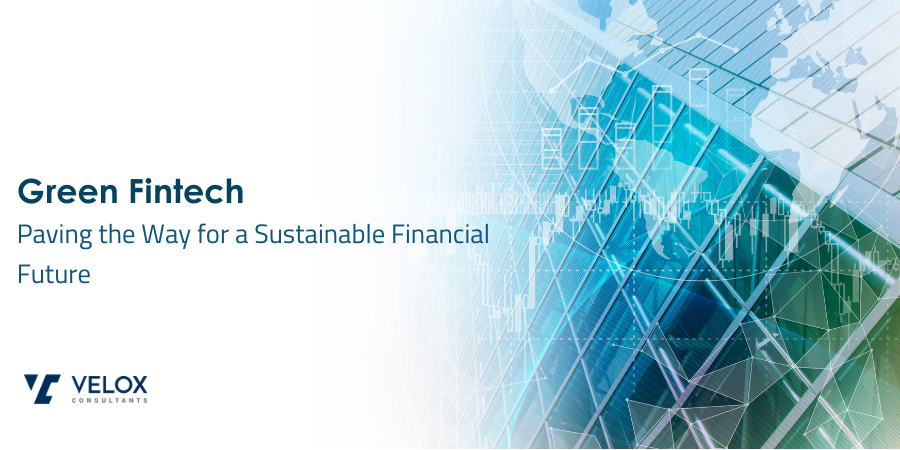Introduction
The financial technology (FinTech) sector has revolutionised how we manage money, invest, and access financial services. With increasing awareness of environmental issues and the urgent need to combat climate change, a new wave of innovation is emerging at the intersection of finance and sustainability—Green FinTech. This innovative approach is not just about financial services but about promoting sustainability and environmental protection, giving us hope for an eco-friendly future.
Green FinTech, in simpler terms, is applying financial technology to promote sustainability and environmental protection. It includes digital banking, investment platforms, and financial services prioritising ecological balance and green initiatives. Green FinTech combines traditional FinTech solutions with sustainable practices to create financial products and services that support environmental goals. It encompasses many applications, from sustainable investing platforms to tools that help track and reduce carbon footprints.
Assuming the brighter future of the Green FinTech market, several agencies and organisations work on various initiatives to promote green finance worldwide.
Some of them are:
- Green Digital Finance Alliance (GDFA): GDFA envisions a dynamic future for Green FinTech, underpinned by innovative technologies and frameworks designed to align financial systems with sustainable development goals. GDFA's initiatives include the launch of the world's first Green FinTech Taxonomy, a classification system intended to standardise and stimulate the green fintech market. It also focuses on creating digital tools and frameworks that mobilise sustainable finance, such as developing digital platforms for green bond trading and creating apps that help individuals make sustainable investment decisions.
- Environmental Finance: Environmental Finance is a prominent platform that offers extensive coverage and insights on green finance, including Green FinTech. It serves as a key resource for news, analysis, and data related to environmental finance, helping stakeholders understand and engage with sustainable financial practices. It publishes in-depth articles analysing the role and potential of fintech in driving sustainable finance. It also organises and reports on events that bring together industry leaders to discuss the latest trends and challenges in green finance.
- Climate Bonds Initiative (CBI): CBI is an international, investor-focused non-profit organisation dedicated to mobilising the $100 trillion bond market for climate change solutions. The primary aim of CBI is to promote large-scale investments that will help transition to a low-carbon and climate-resilient economy. CBI's work has significantly impacted the green bond market, leading to its growth by providing market data, insights, and policy recommendations. They publish regular reports on the state of the green bond market, trends, and emerging opportunities, which have been instrumental in shaping the market's direction and attracting more investors to green bonds.
- Sustainable Finance Geneva (SFG): SFG is a non-profit association founded in 2008 that aims to promote sustainable finance and make Geneva a global hub for responsible finance. SFG brings together a diverse community of professionals from finance, academia, international organisations, and NGOs to foster dialogue, innovation, and collaboration in sustainable finance. SFG has positioned Geneva as a key player in the global sustainable finance landscape, leveraging its status as a major financial centre and its proximity to international organisations.
Key Benefits of Green FinTech
Green FinTech offers transformative benefits for businesses and the environment, leveraging technology to drive sustainability and innovation.
Here are the key advantages:
- Environmental Impact: By promoting sustainable practices and investments, Green FinTech significantly reduces carbon footprints and encourages the adoption of renewable energy sources.
- Economic Growth: Green FinTech is not just about environmental benefits; it's also a catalyst for economic growth. It creates new markets and investment opportunities in green technologies and sustainable projects, driving economic growth while ensuring environmental stewardship. This dual benefit presents a promising future for both the financial and environmental sectors.
- Consumer Engagement: Green FinTech is not just a tool for financial transactions; it's a platform for consumer empowerment. Tools like carbon footprint trackers increase consumer awareness and encourage environmentally friendly financial decisions, fostering a culture of sustainability. By engaging consumers this way, Green FinTech is not just about profits but about promoting responsible financial decisions.
- Transparency and Accountability: Technologies like blockchain enhance transparency in financial transactions and investments, ensuring that funds are utilised for their intended green purposes.
- Regulatory Benefits: Green FinTech helps businesses comply with sustainability mandates and benefit from government incentives by aligning with environmental regulations and standards.
- Innovation and Competitive Edge: Companies that adopt Green FinTech can innovate continuously, gaining a competitive edge in the market by aligning with the growing demand for sustainable products and services.
Green FinTech Categories
Green FinTech encompasses various innovative financial technologies to promote sustainability and address environmental challenges. Based on the document from the Green Finance Platform, here is a detailed overview of the key categories:

Source: Green Digital Finance Alliance, The Swiss Green Fintech Network, Velox Consultants
- Green Digital Payment & Account Solutions: Payment platforms can incorporate eco-friendly features into their services, classifying them as Green FinTech. If a payment provider utilises green accounting software from an external source, the payment service provider and the accounting software provider fall under the Green FinTech category. This integration ensures that sustainable practices are embedded within financial transactions, promoting environmental responsibility throughout the financial ecosystem.
- Green Digital Investment Solutions: Digital platforms offer automated, algorithm-driven green financial planning and investment services with minimal human intervention. These platforms, often termed green robo-advisors, select stocks based on investor preferences and return goals. They provide automated green investment advice, portfolio allocation, and risk assessment based on environmental criteria. The degree of automation varies, with some platforms handling all adjustments automatically after initial input, while others allow more user-driven capital allocation and adjustments.
- Digital ESG-Data & Analytics Solutions: Automated green data collection and analytics solutions for finance include ESG company ratings, green asset ratings, carbon accounting, and risk monitoring for environmental factors. These tools use AI and machine learning to analyse data from sources like reports, media, and social media and can integrate directly with company assets via IoT devices and sensors. They provide comprehensive information for automated credit scoring, impact reporting on green bonds, and monitoring climate or nature-related investment risks.
- Green Digital Crowdfunding & Syndication Platforms: Digital platforms enable raising capital from many individuals or institutional investors to fund green business ventures or projects. Green digital crowdfunding and syndication platforms facilitate financing for green businesses, projects, and transition assets like energy-efficient real estate retrofits. These platforms connect fund seekers with funders and can offer various types of crowdfunding, including donation, reward, equity, and debt crowdfunding. The level of automation varies, with some platforms offering fully automated processes while others require manual inputs and updates.
- Green Digital Risk Analysis & InsurTech: Software and platforms that enhance green insurance products and minimise climate-related risks use AI, IoT, and satellite data for risk modelling and forecasting. These tools help underwriters evaluate and price climate risks accurately. Predictive analytics and real-time alert systems can mitigate or prevent risks using sensor data. Additionally, smart contracts streamline climate-related insurance processes, including underwriting and payouts, making them more efficient.
- Green Digital Deposit & Lending Solutions: Digital savings platforms finance eco-friendly projects, while digital loans support green initiatives and behaviours. These loans meet regulatory green standards and include consumer loans for net-zero vehicles and other sustainable products. They also encompass digital solutions for green mortgages, utilising IoT and sensors for loan calculations and retrofit financing. Additionally, digital lending platforms for transition finance monitor and promote the green behaviours of borrowers, providing a comprehensive digital experience for financing environmental sustainability.
- Green Digital Asset Solutions: Tokens and cryptocurrencies designed for green purposes and blockchain infrastructures tailored for environmental use cases. This includes tokenising green assets like carbon or biodiversity credits and issuing traditional green assets in tokenised form. Platforms for green security token offerings (STO) provide fractional ownership of green assets. These solutions operate on various blockchain types (public, private, or semi-private) and use smart contracts for automated settlement, reconciliation, distribution, and payments, enhancing transparency and efficiency in green finance.
Key Technologies Used for Green FinTech
Integrating advanced technologies in Green FinTech is pivotal in driving sustainable financial practices, enhancing transparency, and promoting environmental responsibility across the financial sector. Various components of Green FinTech leverage advanced technologies like AI, blockchain, IoT, and big data to enhance sustainability in financial services, driving both environmental and economic benefits.
- Artificial Intelligence (AI): AI helps analyse large datasets to identify and manage environmental risks, optimise investment strategies, and enhance predictive analytics for climate-related financial impacts.
- Blockchain & Tokenisation: Blockchain ensures transparency and security in green investments through tokenising green assets, smart contracts for automated processes, and securing carbon credits and other environmental assets.
- Internet of Things (IoT): IoT devices and sensors collect real-time data on environmental conditions, which is crucial for green lending, insurance risk assessments, and monitoring the environmental impact of financed projects.
- Big Data Analytics: Analysing vast amounts of data from various sources helps in ESG (Environmental, Social, and Governance) ratings, carbon footprint calculations, and identifying green investment opportunities.
- Machine Learning (ML): ML algorithms enhance the accuracy of climate risk models, improve green credit scoring, and optimise the allocation of green investments based on historical data and trends.
- Cloud Computing: Cloud platforms enable scalable and flexible data storage and processing, facilitating the integration and analysis of environmental data from diverse sources.
- Digital Platforms and Mobile Apps: These tools provide user-friendly interfaces for consumers and businesses to engage in sustainable financial activities, such as green investments, crowdfunding, and carbon footprint tracking.
Emerging Green FinTech Companies
Green FinTech companies are leading the charge in integrating financial technology with environmental sustainability, creating innovative solutions that drive economic growth and environmental stewardship.
Some of the emerging Green FinTech companies are:
- Neufin: Based in India, Neufin is a technology platform that facilitates access to green financing, aiming to power the transition to net-zero emissions globally. Founded in 2021, Neufin addresses the significant gap in climate finance, estimated at $10 trillion annually. The platform simplifies securing green financing for businesses, covering sectors such as solar energy, waste-to-energy projects, carbon removal, and electric vehicles.
- Senken: Senken is a pioneering blockchain-based platform specialising in the carbon credit market. Founded in 2021 and headquartered in Berlin, Germany, Senken offers a comprehensive solution for buying, selling, and managing carbon credits through its innovative digital marketplace. The platform uses blockchain technology to enhance transparency, traceability, and liquidity in the carbon markets.
- Carbonx: Carbonx Climate is a cutting-edge platform for permanent carbon removal solutions. Founded in 2021 and headquartered in France, Carbonx focuses on helping organisations achieve their net-zero targets by facilitating the procurement and management of high-quality carbon removal credits. By focusing on permanent carbon removal and integrating innovative technologies, Carbonx Climate is crucial in advancing global efforts to combat climate change and achieve sustainability goals.
- Secured Carbon: Based in the US, Secured Carbon is a financial technology company specialising in the verification, financing, and monitoring of carbon capture infrastructure. Founded in 2022, the company leverages blockchain technology to create a tamper-proof ledger that collects real-time satellite and tower data on CO2, CH4, and NO2 emissions. This data is used to map the origin of emissions and identify the fiduciary owners of greenhouse gases, facilitating a mature carbon economy.
- Stripe Climate: Stripe Climate is an initiative by Stripe, the global technology company known for building economic infrastructure for the internet, to address climate change through innovative carbon removal solutions. Launched in October 2020, Stripe Climate allows businesses using Stripe's payment platform to allocate a fraction of their revenue towards funding carbon removal technologies. Stripe Climate is designed to help the world achieve net-zero emissions by 2050 by reducing new emissions and removing excess carbon from the atmosphere.
- Treecard: TreeCard is a FinTech company promoting sustainability through innovative financial products. Founded in 2020, TreeCard offers a wooden debit card that channels profits into reforestation projects, allowing users to plant trees with every purchase. The company has partnered with Ecosia, a search engine that uses its ad revenue to plant trees, to enhance its environmental impact.
Our Perspective
The Green FinTech market is rapidly evolving as financial technologies increasingly integrate sustainability into their core functionalities. Diverse, innovative solutions characterise the market, including sustainable investment platforms, carbon management tools, green digital banking services, and blockchain applications for environmental tracking. Many companies and technology platforms are pioneering green financing, enabling consumers to monitor and reduce their carbon footprints. Integrating technology and sustainability drives significant environmental benefits and opens new avenues for economic growth as businesses and consumers seek to make more eco-conscious financial decisions.
Looking ahead, the future of Green FinTech is poised for exponential growth. As global awareness of climate change intensifies, there is an increasing demand for financial products that generate returns and contribute to environmental sustainability. The market is expected to expand further with advancements in AI, blockchain, and IoT, which will enhance the capabilities of Green FinTech solutions. Strategic collaborations between traditional financial institutions and Green FinTech startups will be crucial in scaling these innovations. Moreover, supportive regulatory frameworks and government incentives will play a pivotal role in accelerating the adoption of sustainable financial technologies, making them an integral part of the global financial ecosystem.
Green FinTech companies should develop user-friendly, scalable solutions that can seamlessly integrate into existing financial systems to capitalise on this growth potential. Emphasising transparency, accountability, and tangible environmental impacts will be key to gaining consumer trust and fostering widespread adoption. By continuously innovating and aligning their products with global sustainability goals, Green FinTech firms can drive substantial environmental benefits and unlock significant market opportunities, positioning themselves at the forefront of the financial industry's transformation towards sustainability.
At Velox Consultants, we are committed to driving the adoption of green fintech for a sustainable financial future. By leveraging the capabilities of green financial technologies, we believe businesses can significantly improve their financial efficiency, reliability, and integration of sustainable practices. Our recommendations aim to guide businesses in successfully adopting green fintech solutions and realising their full potential for sustainable growth. By investing in green fintech, businesses can enhance operational efficiency and contribute to a more sustainable and resilient financial ecosystem.
In the fast-paced business world, staying ahead of the competition requires timely and accurate insights. Velox Consultants has recently launched VeloData Insights, a real-time market research service that delivers just that — providing actionable intelligence as events unfold. Whether it's monitoring industry trends, analysing competitor activities, or understanding consumer preferences, our comprehensive market monitoring and consumer insight services ensure you have the data you need right when needed. This immediate access to up-to-the-minute data empowers your strategic moves and gives you a competitive edge in a constantly evolving market landscape.
Contact us at consult@veloxconsultants.com to learn more about our real-time market research services.





